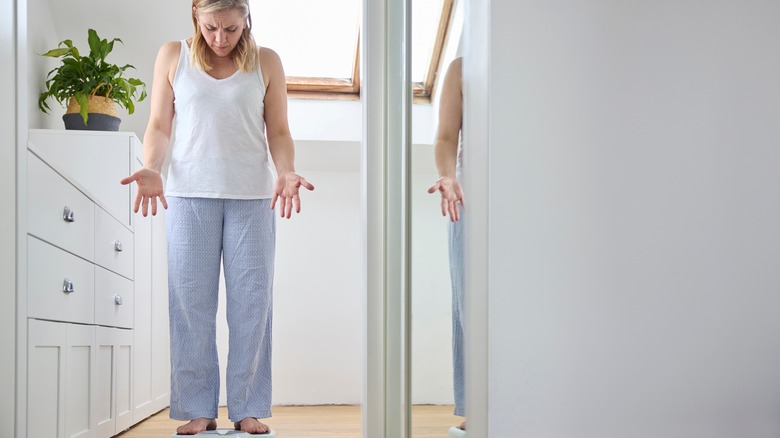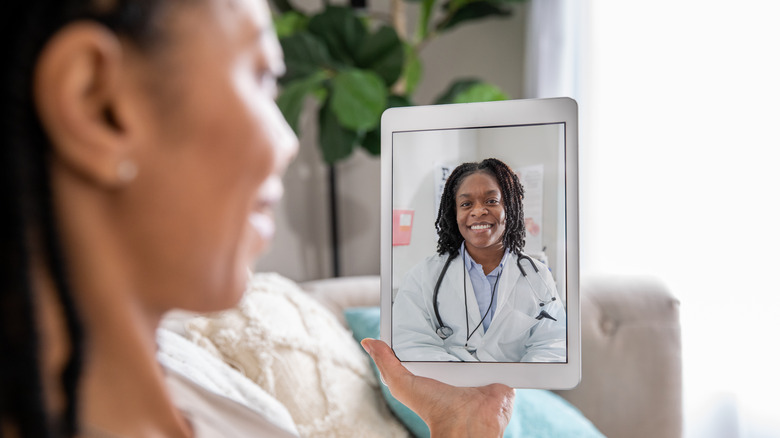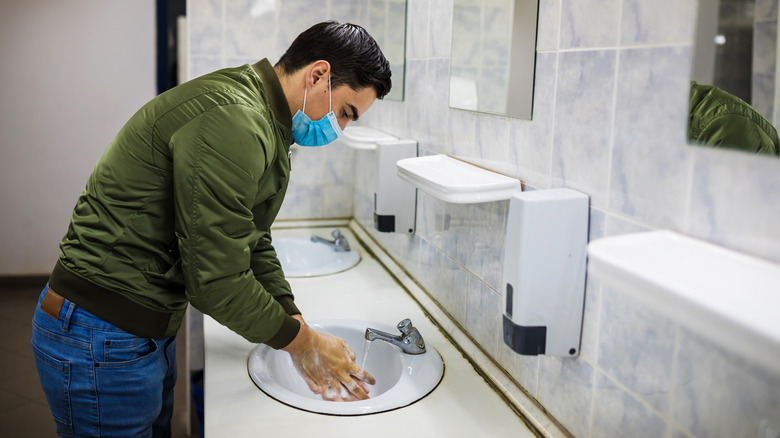You're Not The Same After The Pandemic
Before the COVID-19 pandemic hit, the idea of a worldwide health crisis seemed like the kind of Hollywood scenario you'd see in a movie like 2011's "Contagion." However, three years after the coronavirus scare turned our lives upside down and, according to the World Health Organization, caused the deaths of at least three million people, we are only just now beginning to take stock of its impact. Even as wearing masks becomes less common, public gatherings resume, and people return to work, the post-pandemic world is still different from the one that came before it.
For one thing, the stress of the pandemic has taken its toll. The American Association of Retired Persons reports that one in five adults over the age of 50 has had a difficult time getting better sleep during COVID, and many have also delayed critical medical checkups, such as colonoscopies and mammograms. Additionally, the Organisation for Economic Co-Operation and Development reports that younger adults have experienced a sharp decline in mental health and overall happiness. The report also shows that, in the years since the pandemic, there has been a steady increase in depression, anxiety, loneliness, and disconnection across all demographics. These are just some of the ways that living in a post-COVID world is impacting your life.
Your personality is different
The COVID pandemic left a lot of us feeling isolated, alone, and unsure of where to turn for help. And, unlike Will Smith in "I Am Legend," we weren't just hanging out with our dogs and memorizing dialogue from "Shrek." The World Health Organization reports that the pandemic made people feel disconnected from their communities and loved ones, unable to find support, and worried about their financial situation and health. As a result, anxiety and depression around the globe increased by 25%.
In addition, a 2022 study conducted by the Florida State University College of Medicine and published in PLOS One revealed that young people experienced personality changes after the pandemic. The study showed that environmental pressures caused by the pandemic caused people to feel moodier, less cooperative, and less trusting. On top of that, there was a decline in more positive personality traits, including extroversion, openness, and conscientious behavior.
Your risk of hypertension is higher
According to a 2023 study published in Hypertension, people who were hospitalized for COVID-19 were twice as likely to develop hypertension as people who were hospitalized for the flu during the same time period. In addition to COVID, the study found that there were other pandemic-related factors present that led to the onset of high blood pressure. These included stress, isolation, reduced physical activity, and subsequent weight gain.
In addition to the Hypertension study, a 2021 study published in Circulation presented some troubling numbers. The study looked at people who had no blood pressure increases between 2019 and the onset of the COVID-19 pandemic in March of 2020. These people showed significant increases in blood pressure between April and December of 2020, when the pandemic was at its peak. The results of this study indicate that an increase in blood pressure could be linked to the pandemic.
Your brain has changed
The stress, worry, and anxiety of the pandemic took its toll on everyone, but studies have shown that young people may have been hit even harder. In a recent study released by the National Institutes of Health, researchers from the Bay Area near San Francisco studied the brains of teenagers before and after the pandemic. They found that after the pandemic, teenagers experienced more anxiety and depression. More troublingly, changes in the brain's cortex that happen normally with aging happened much faster. On average, teenagers' brains aged approximately three years during the pandemic.
A 2022 study published in Brain, Behavior, and Immunity showed that even people who were never actually infected with COVID-19 may have also experienced changes to the structure of the brain. The study showed signs of neuroinflammation in patients after the lockdown restrictions were put in place. These people also showed higher signs of mental and physical fatigue, as well as mood disorders.
If you or someone you know needs help with mental health, please contact the Crisis Text Line by texting HOME to 741741, call the National Alliance on Mental Illness helpline at 1-800-950-NAMI (6264), or visit the National Institute of Mental Health website.
You may be more depressed or anxious
For some people, trying to return to normal, post-pandemic life has proven to be a difficult challenge. According to a 2021 study published in The Lancet, there has been an increase in depressive symptoms from 27.8% in 2020 to 32.8% a year later. Another report, published during the pandemic by Massachusetts General Hospital, showed that such factors as grief, financial worries, social distancing, and concerns over contracting the virus had all contributed to an increase in depression among adults.
Additionally, KFF reports that there has been an increase in substance misuse, drug-related deaths, and suicide since the pandemic. In 2021 alone, there were more than 100,000 deaths in the U.S. that could be attributed to drug overdose. During that time, the overdose rate also increased by 50%. In addition to drug-related deaths, deaths related to alcohol use went up by 38% during the pandemic.
If you or anyone you know needs help with addiction issues, help is available. Visit the Substance Abuse and Mental Health Services Administration website or contact SAMHSA's National Helpline at 1-800-662-HELP (4357).
Your weight may be affected
The pandemic hit us all hard on many different fronts. But perhaps one of the most distressing after-effects of post-COVID life was the unexpected toll it took on our waistlines.
According to a survey conducted by the American Psychological Association, 61% of Americans experienced changes in weight, either gains or losses, that were undesirable. The poll also showed that 42% of people gained an average of 29 pounds during the pandemic.
There were many factors at work that impacted people's weight during this time. Per a 2022 study published in Diabetes & Metabolic Syndrome, psychological stresses related to the pandemic played a role in weight gain. The study showed that 36% of people profiled reported eating less healthy, with 44% saying that they increased snacking. Stress raises cortisol levels, according to a 2013 study published in Minerva Endocrinology, which can increase cravings for hyperpalatable foods that are high in fat and salt.
Your boundaries have changed
Personal space has always been important, with different people being comfortable with different levels of distance between others. A 2017 study published in the Journal of Cross-Cultural Psychology showed that people tended to stay at least three feet away from people they didn't know and kept a distance of around two feet with acquaintances. But, when the pandemic hit, everyone became keen on the concept of "social distancing," maintaining a distance of at least six feet apart in order to prevent the transmission of COVID-19. And, the evidence showed that it was successful. The MD Anderson Cancer Center reports that the social distancing practices of most countries prevented more than one million cases of COVID during a two-week period.
Since the pandemic, the parameters of social distancing have changed. A 2021 study conducted by Massachusetts General Hospital and published in Frontiers in Psychology showed that, in the wake of COVID-19, the boundaries of personal space have grown larger. While the study acknowledges that, over time, we may go back to a pre-pandemic level of social distance, it's hard to gauge what will happen, as there is no precedent to go on.
The way you go to the doctor is different
Prior to the pandemic, if you needed to see the doctor, it was a fairly straightforward process. You called, made an appointment, went to his or her office, and got checked out. Once lockdowns hit, however, the entire way you planned your medical visits changed, possibly irrevocably. Although, according to a 2022 study published in Primary Care, 76% of hospitals had telemedicine services before the COVID-19 pandemic, they were not widely used by patients. Once the pandemic hit, the study revealed that the use of telemedicine increased by 766% in the first three months.
As the pandemic has subsided, the use of telemedicine has actually increased. A report released in 2023 by the Office of the National Coordinator for Health Information Technology has shown that 80% of physicians plan to continue using telemedicine as an outlet for patient visits going forward. Additionally, a 2023 survey conducted by Doximity showed that 85% of telemedicine patients reported that their experience was equivalent or superior to an in-person appointment. On top of that number, 83% of patients noted that they would be inclined to continue using telemedicine going forward.
You're more aware of disease
The pandemic has made everyone keenly aware of the downside of not adopting preventative measures when it comes to our health. The onset of COVID-19 put the power of those measures in sharp relief. A 2021 study published in the British Medical Journal showed that wearing masks, for example, could help reduce the chances of cat COVID infection by 53%. Handwashing was similarly effective, also showing a 53% success rate.
Today, with COVID cases at a much lower level, more and more people are not wearing masks when out in public. However, according to data compiled by the COVID States Project, 27% of people were still masking up when out in public as of January 2023. Additionally, a 2021 study published in Environmental Sciences Europe showed that the number of people who use liquid soap regularly has increased to 41%, and the number of people who both use and carry hand sanitizer has increased as well. Pre-COVID, only 4.1% of people had hand sanitizer with them. That number has since jumped up to nearly 40% following the pandemic.
You're more adaptable
Having so much of our lives thrown into upheaval during the pandemic has made us much less rigid. A 2022 study published in PLOS ONE has shown that, after the pandemic, people have become more able to adapt to such things as creating a new work environment at home, learning new skills and working with new technology, and being more creative when it came to problem solving.
Additionally, PA Consulting reported that, following the pandemic, people were more organized at work, planning on monthly (instead of annual) cycles and collaborating with their peers more effectively. The report also demonstrated how the American College of Chest Physicians and American Thoracic Society used the new, more agile work practices, inspired by the pandemic's working conditions, to launch a new digital telemedicine system. The hope is that other companies will learn from the way employees have had to adapt and rethink their approach since the pandemic to make working more efficient and effective, both for the workers and the end users.










